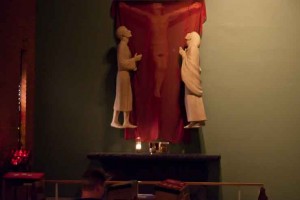Every Sunday I remind us all that worship is an offering we make to God, which is why worship must be participatory, not passive. What I don’t consider in these introductory remarks is why we might want to make that offering. Here is that consideration:
 One of the reasons why worship seems so strange and even irrelevant is that worship offers us an alternative reality from the one we usually spend time in. The Sunday service proclaims one message: God is God, and we are God’s people. The service defines that statement, but rarely do we take the time in worship to recognize how utterly strange this message is. Throughout the week we are bombarded with other messages about who we are—each of us being defined, voluntarily and not, in countless ways through employment, media, family, history, institutions, economics—just to name a few of the forces around us. These various forces mold our identities, determining our interpretations of events and opportunities. Some might empower, while others demean and depress, but only Sunday’s message sets us on the journey of salvation and freedom. In this alternative reality, our ambitions and errors, achievements and failures are understood as responding to God’s word because we are not at the center of it all, God is. This reality becomes a reality for us as we respond to that invitation, forsaking the other voices and being God’s people. Worship invites us to remember and practice being part of this God-given reality.
One of the reasons why worship seems so strange and even irrelevant is that worship offers us an alternative reality from the one we usually spend time in. The Sunday service proclaims one message: God is God, and we are God’s people. The service defines that statement, but rarely do we take the time in worship to recognize how utterly strange this message is. Throughout the week we are bombarded with other messages about who we are—each of us being defined, voluntarily and not, in countless ways through employment, media, family, history, institutions, economics—just to name a few of the forces around us. These various forces mold our identities, determining our interpretations of events and opportunities. Some might empower, while others demean and depress, but only Sunday’s message sets us on the journey of salvation and freedom. In this alternative reality, our ambitions and errors, achievements and failures are understood as responding to God’s word because we are not at the center of it all, God is. This reality becomes a reality for us as we respond to that invitation, forsaking the other voices and being God’s people. Worship invites us to remember and practice being part of this God-given reality.
Holy Week is all that in spades! It offers us the ultimate reorientation from the center of the universe to participation in God’s vision in two ways.
First, in the events of Holy Week, we observe how terribly wrong God’s people can be. The religious leaders who sent Jesus to the cross thought they were doing God’s work. Jesus was guilty of nothing more than preaching, but to the religious establishment, his preaching presented a threat to their careful stability and power. Some of Jesus’ followers (Judas, for example) may have also thought that Jesus’ arrest was the beginning of his triumph over the Roman authorities. We don’t anticipate that message but we need it. Because our judgments and prejudices are not God’s, as God’s people we can’t be living in a permanent fortress of our own truth and righteousness. Instead we are traveling, always ready to turn (repent) from our errors and follow Christ in a new way. Holy Week reminds us that we are not in charge and that’s good for our souls.
Of course, historically, Christians have been more than happy to take God’s place. The events of Holy Week are hardly the last acts of violence in the name of God. This is because while we remember the events of Holy Week, we ignore what they reveal—the depth of God’s presence. Too frequently popular Christian theology explains Jesus’ sufferings as something God does to Jesus, in order that somehow Jesus might fulfill some divine requirement and persuade God to change his mind about a creation he once loved but now hates. But if God is present in Jesus, from birth to Easter, then we can understand that these events are not meant to persuade God, but to persuade us of what we need to know: Grace is strong enough to win. Not just for a chosen few delivered from God’s wrath, but for all of God’s creation, God is on our side. Only through the events of Holy Week can we experience Good News large enough to include us all.
If this description seems too abstract and theological, then you need to participate in Holy Week! It’s the story, not the theology that will tell us who we are and who God is. Both guilt and joy are part of Holy Week. We enact the part of the crowd on Palm Sunday, both proclaiming Jesus as King and demanding his death, because both parts describe us. We receive his last instructions without fully embracing the implications as his disciples on Maundy Thursday. We watch and mourn on Good Friday, confronted with both horror and helplessness. All this, in order to rejoice on Easter!
Check the events of Holy Week in order to find out more about each particular service. And then come–your soul will thank you for it!
